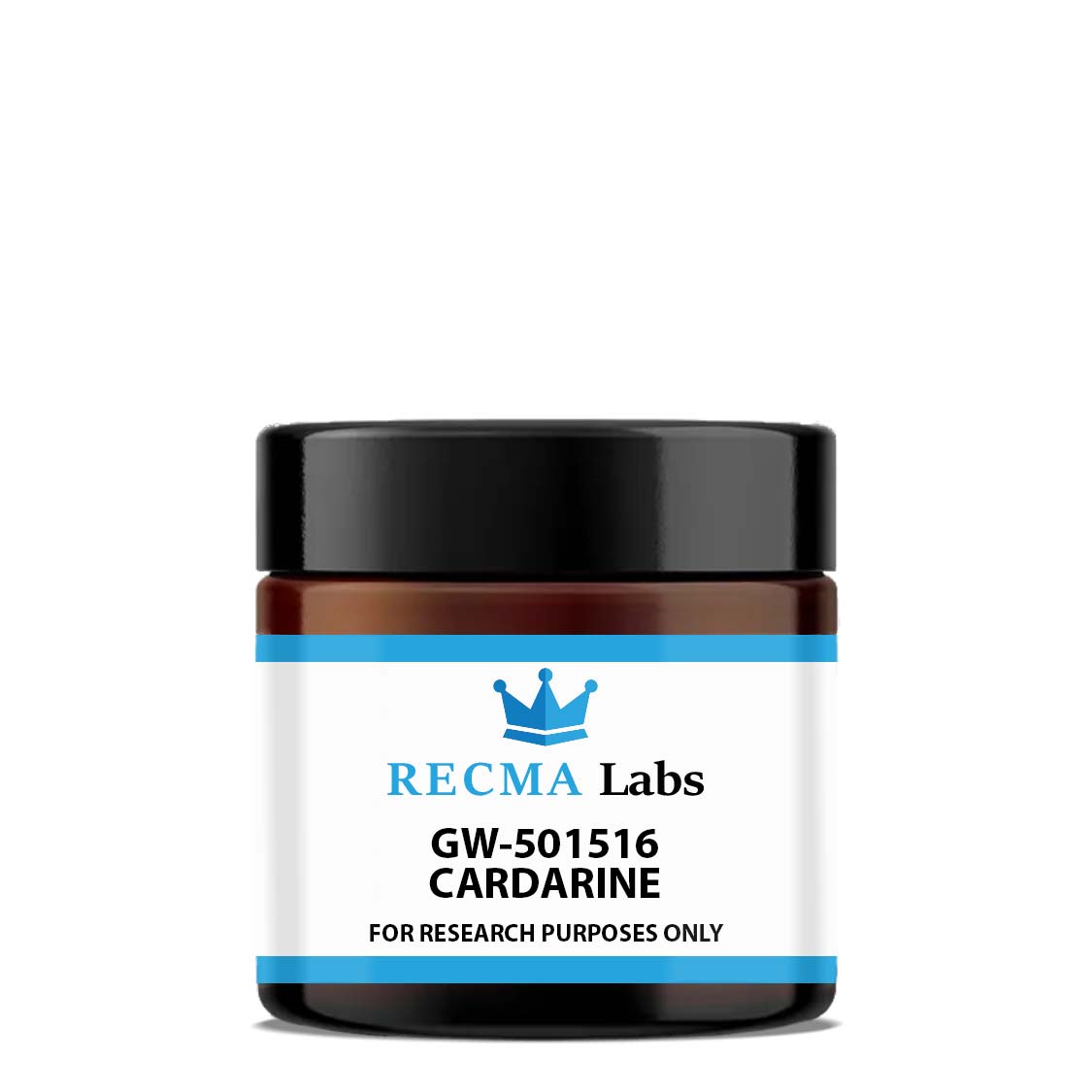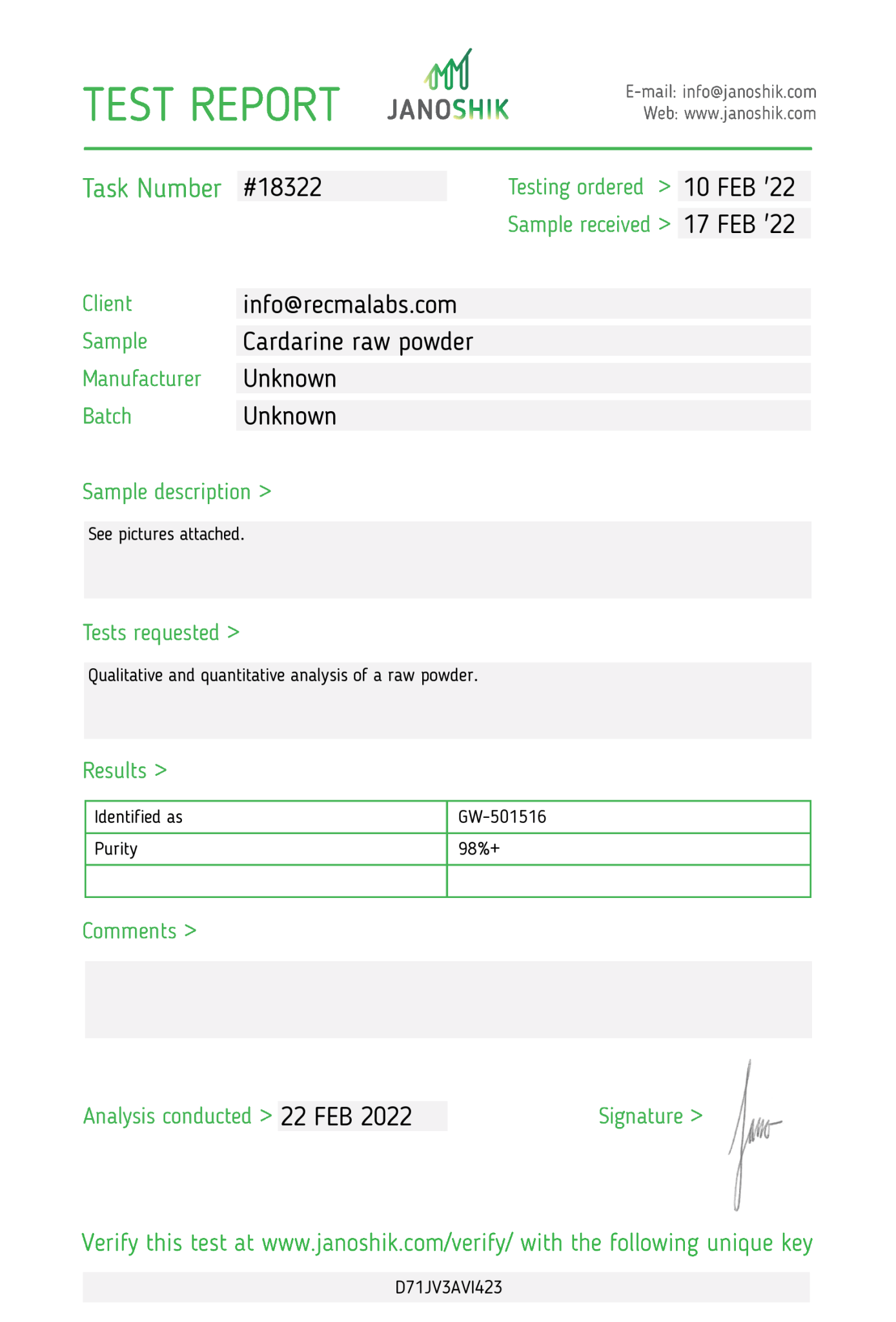CARDARINE (GW-501516) Powder, 1gr
CARDARINE (GW-501516) Powder, 1gr
Couldn't load pickup availability
Cardarine GW-501516
GW-501516 is a PPAR agonist (Peroxisome Proliferator-Activated Receptor) initially developed for hyperlipidemia, obesity, metabolic dysfunction, and heart disease by GlaxoSmithKline, a multinational pharmaceutical company. The compound is also known by various other names such as Endurobol and Cardarine and is often cited in research studies as a PPARδ agonist.
Numerous studies have demonstrated that GW-501516 impacts fatty acid metabolism, skeletal muscle endurance, and the balance of glucose and insulin.
Given that PPARδ plays a crucial role in mitochondrial respiration, temperature regulation, inflammatory mediation, skin and muscle repair, skeletal reprogramming, and keratinocyte differentiation, it can be hypothesized that GW-501516 may also impact these additional areas. Read more here.
One mouse study explicitly showcased the effect of GW-501516 on the endurance levels of mice, both trained and untrained. After three weeks of treatment with GW-501516, trained rats exhibited a 31.2% increase in their total running distance, while untrained rats improved their total distance by 68.6%. Even one week of treatment with GW-501516 increased running distance by 48.6% compared to the control group.
The group of rats that both received Cardarine and were previously trained for running showed a higher utilization of longer saturated fatty acids and triglycerides, potentially due to increased fatty acid metabolism following PPARδ activation, thereby affecting PDK4 and other mediating pathways of fatty acid oxidation. Read more here.
Molecular analyses revealed that PPARδ is involved in exercise-induced skeletal muscle metabolism reprogramming by regulating the expression of genes associated with contractile proteins, mitochondrial biogenesis, and lipid oxidation.
Another study corroborated these findings by administering GW-501516 to mice on a high-fat diet. While the treated group experienced only slight weight loss, metabolic markers like reduced insulin resistance, increased metabolism, heightened mitochondrial activity, and reduced lipids in skeletal muscles were observed. Additionally, both plasma glucose and blood insulin levels were lowered in genetically obese mice. Read more here.
One study indicated that GW-501516 could also play a role in reducing inflammation, particularly in the liver. In rats fed a high-fructose diet, GW-501516 decreased inflammation markers ACE/AT1r-axis while increasing genes that regulate beta-oxidation and reducing genes governing fat cell and glucose production. Read more here.
Similar results were noted in primate studies. Research involving middle-aged, overweight to obese rhesus monkeys indicated that HDL cholesterol increased, LDL cholesterol decreased, along with fasting triglycerides and fasting insulin levels. Researchers believe that GW-501516 could be a significant breakthrough for cardiovascular diseases like atherosclerosis and could lessen the severity of metabolic syndromes. Read more here.
DISCLAIMER
This material is sold for use in laboratory research only. Terms of sale apply. Not for human consumption, nor for medical, veterinary or domestic use. Please familiarize yourself with our DISCLAIMER before ordering.
Data Sheet
Cardarine (GW501516) – Powder, 1g
| Application | PPARδ receptor agonist |
| CAS | 317318-70-0 |
| Molar Mass | 453.498 g/mol |
| Chemical Formula | C21H18F3NO3S2 |
| IUPAC Name | {4-[({4-methyl-2-[4-(trifluoromethyl)phenyl]-1,3-thiazol-5-yl}methyl)sulfanyl]-2-methylphenoxy}acetic acid |
| Synonyms | GW501516, Cardarine, Endurobol, GSK-516 |
| Storage | Room temperature |
| Solubility | Soluble in PEG400, Ethanol |
| Organoleptic Profile | White to beige fine powder |
| Physical Form | Solid |
| Specification | ≥98% |
| Terms | This material is sold for laboratory research use only. Terms of sale apply. Not for human consumption, nor medical, veterinary, or household uses. Please familiarize yourself with our Terms & Conditions prior to ordering. |
| Additional Notes | This compound was withdrawn from clinical trials due to promotion of carcinogenesis. |




